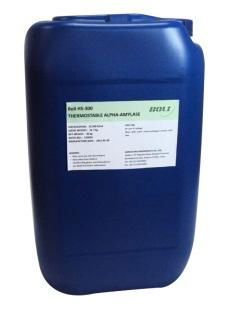| Model: | boli-hs-300 |
|---|---|
| Brand: | Boli |
| Origin: | Made In China |
| Category: | Chemicals / Food Additives |
| Label: | alpha amylase , food additive , enzyme for starch |
| Price: |
-
|
| Min. Order: | - |
Product Description
A very robust Alpha-amylase with exceptional thermostability. Ideal for medium-temperature cooking process in fuel ethanol production:
Enhanced liquefaction efficacy
Decreased formation of non-fermentable sugars
Fits to various starch materials, e.g. tapioca, corn, wheat and rice
Thermostable Alpha-Amylase Description
Boli HS-300 is a thermostable Alpha-Amylase derived from a modified strain of Bacillus licheniformis. It is an endoamylase that hydrolyzes alpha-1,4-glucosidic bonds to quickly reduce the viscosity of gelatinized starch, producing soluble dextrins and oligosaccharides under various process conditions.
Thermostable Alpha-Amylase Characteristics
Declared Enzyme: Alpha-Amylase
Systematic Name: EC 3.2.1.1, 1,4-alpha-D-glucan glucanohydrolase
Activity: 37,500 U/ml (minimum)
Appearance: Light to dark brown liquid
Product pH: 5.5 to 7.0
Specific gravity: 1.15 to 1.25 g/ml
Thermostable Alpha-Amylase Effect Of PH
Boli HS-300 is active over a wide pH range depending on the actual applications. For maximum activity, the optimal pH is 6.0 ~ 6.4. The stable pH range is 5.0 ~ 10.0 at temperature of 25°C. The exact pH optimum depends on actual processing conditions, such as temperature, substrate concentration and time.
Thermostable Alpha-Amylase Effect Of Temperature
Optimum temperature of Boli HS-300 for interval liquefaction is above 90°C. It liquefies starch substrates promptly at 95 ~ 100°C. Boli HS-300 demonstrates exceptional thermal stability at temperatures up to 105 ~ 110°C, maintains its stability for 5 ~7 minutes and keeps on liquefying rapidly. The exact temperature optimum of this product depends on the actual processing conditions, including pH, substrate concentration and processing time.
Thermostable Alpha-Amylase Concentration Of Calcium
The presence of calcium increases the thermal stability of Boli HS-300. It requires a very low calcium concentration and calcium additions of 50 ~ 70 ppm (dry solid basis) are sufficient to ensure its enzyme stability.
Thermostable Alpha-Amylase Inhibitors
Copper, titanium, and cobalt ions are moderate inhibitors for Boli HS-300, whereas aluminum, lead and zinc ions act as strong inhibitors.
Thermostable Alpha-Amylase Usage Guidelines
Step 1. Adjust pH to 6.0 ~ 6.4
Step 2. Add calcium (50 ~ 70 ppm dry solid basis) *
Step 3. Add Boli HS-300**
Step 4. Spary the slurry at 105 ~ 110ºC for 5 minutes
Step 5. Lower the temperature to 90 ~ 100ºC and keep for 100 minutes
Note:
Calcium is not needed when extremely hard water (above 10 German degrees) is used.
Actual dosage of Boli HS-300 depends on the starch substrate, application, process, substrate concentration and other factors. To optimize the dosage, it is recommended to conduct a number of liquefaction trials prior to routine use of this product. A good starting point for dosage is 0.4 ~ 0.6 kg/TDS.
Member Information
| Jiangsu Boli Bioproducts Co., Ltd. | |
|---|---|
| Country/Region: | Jiang Su - China |
| Business Nature: | Manufacturer |
| Phone: | 151 5221 3005 |
| Contact: | yang (SALE) |
| Last Online: | 07 Aug, 2013 |




